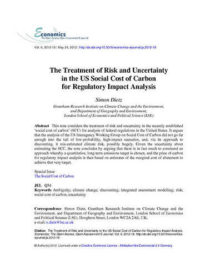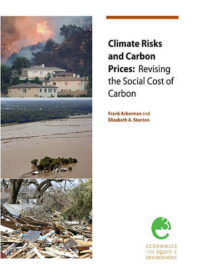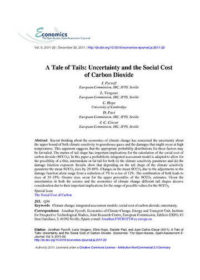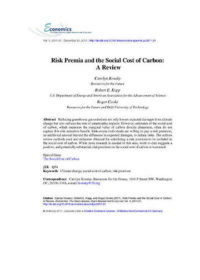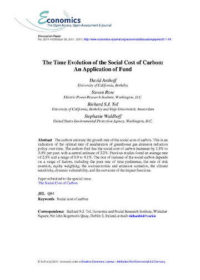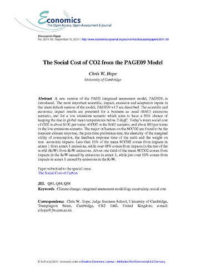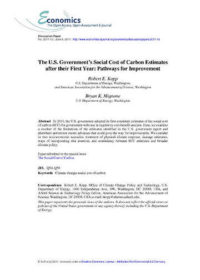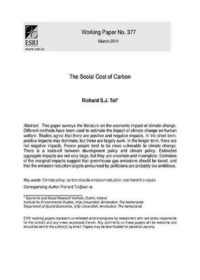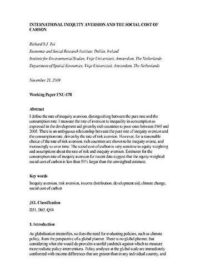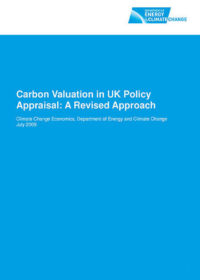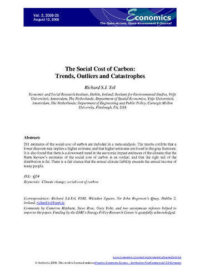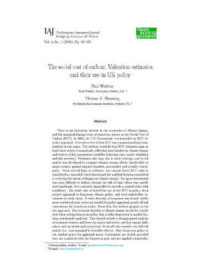Resources
Publications
Our publications, reports and research library hosts over 500 specialist reports and research papers on all topics associated with CCS.
View our Publication Library Disclaimer.
Filter by
The treatment of risk and uncertainty in the US social cost of carbon for regulatory impact analysis
24th May 2012
Topic(s): Economics, Social cost
Disclaimer
The content within the Global CCS Institute Publications, Reports and Research Library is provided for information purposes only. We make every effort and take reasonable care to keep the content of this section up-to-date and error-free. However, we make no claim as to its accuracy, currency or reliability.
Content and material featured within this section of our website includes reports and research published by third parties. The content and material may include opinions and recommendations of third parties that do not reflect those held by the Global CCS Institute.
Climate risks and carbon prices: Revising the social costs of carbon
4th April 2012
Topic(s): Carbon capture use and storage (CCUS), Economics, Policy law and regulation, Social cost
The social cost of carbon, or marginal damage caused by an additional ton of carbon dioxide emissions, has been estimated by a U.S. government working group at $21 in 2010. That calculation, however, omits many of the biggest risks associated with climate change, and downplays the impact of our current emissions on future generations. This reanalysis explores the effects of uncertainty about climate sensitivity, the shape of the damage function, and the discount rate. This paper shows that the social cost of carbon is uncertain across a broad range, and could be much higher than $21. In the worst case, it could be almost $900 in 2010, rising to $1,500 in 2050. The most ambitious scenarios for eliminating carbon dioxide emissions as rapidly as technologically feasible (reaching zero or negative net global emissions by the end of this century) require spending up to $150 to $500 per ton of reductions in carbon dioxide emissions by 2050. Using a reasonable set of alternative assumptions, therefore, the damages from a ton of carbon dioxide emissions in 2050 could exceed the cost of reducing emissions at the maximum technically feasible rate. Once this is the case, the exact value of the social cost of carbon loses importance: the clear policy prescription is to reduce emissions a rapidly as possible, and cost-effectiveness analysis offers better insights for climate policy than cost-benefit analysis.
Disclaimer
The content within the Global CCS Institute Publications, Reports and Research Library is provided for information purposes only. We make every effort and take reasonable care to keep the content of this section up-to-date and error-free. However, we make no claim as to its accuracy, currency or reliability.
Content and material featured within this section of our website includes reports and research published by third parties. The content and material may include opinions and recommendations of third parties that do not reflect those held by the Global CCS Institute.
A tale of tails: uncertainty and the social cost of carbon dioxide
22nd December 2011
Topic(s): Economics, Policy law and regulation, Social cost
Disclaimer
The content within the Global CCS Institute Publications, Reports and Research Library is provided for information purposes only. We make every effort and take reasonable care to keep the content of this section up-to-date and error-free. However, we make no claim as to its accuracy, currency or reliability.
Content and material featured within this section of our website includes reports and research published by third parties. The content and material may include opinions and recommendations of third parties that do not reflect those held by the Global CCS Institute.
Risk premia and the social cost of carbon: a review
20th December 2011
Topic(s): Economics, Social cost
Disclaimer
The content within the Global CCS Institute Publications, Reports and Research Library is provided for information purposes only. We make every effort and take reasonable care to keep the content of this section up-to-date and error-free. However, we make no claim as to its accuracy, currency or reliability.
Content and material featured within this section of our website includes reports and research published by third parties. The content and material may include opinions and recommendations of third parties that do not reflect those held by the Global CCS Institute.
The time evolution of the social cost of carbon: an application of fund
28th October 2011
Topic(s): Economics, Social cost
Disclaimer
The content within the Global CCS Institute Publications, Reports and Research Library is provided for information purposes only. We make every effort and take reasonable care to keep the content of this section up-to-date and error-free. However, we make no claim as to its accuracy, currency or reliability.
Content and material featured within this section of our website includes reports and research published by third parties. The content and material may include opinions and recommendations of third parties that do not reflect those held by the Global CCS Institute.
Disclaimer
The content within the Global CCS Institute Publications, Reports and Research Library is provided for information purposes only. We make every effort and take reasonable care to keep the content of this section up-to-date and error-free. However, we make no claim as to its accuracy, currency or reliability.
Content and material featured within this section of our website includes reports and research published by third parties. The content and material may include opinions and recommendations of third parties that do not reflect those held by the Global CCS Institute.
The U.S. Government’s social cost of carbon estimates after their first year: pathways for improvement
8th June 2011
Topic(s): Economics, Social cost
Disclaimer
The content within the Global CCS Institute Publications, Reports and Research Library is provided for information purposes only. We make every effort and take reasonable care to keep the content of this section up-to-date and error-free. However, we make no claim as to its accuracy, currency or reliability.
Content and material featured within this section of our website includes reports and research published by third parties. The content and material may include opinions and recommendations of third parties that do not reflect those held by the Global CCS Institute.
Disclaimer
The content within the Global CCS Institute Publications, Reports and Research Library is provided for information purposes only. We make every effort and take reasonable care to keep the content of this section up-to-date and error-free. However, we make no claim as to its accuracy, currency or reliability.
Content and material featured within this section of our website includes reports and research published by third parties. The content and material may include opinions and recommendations of third parties that do not reflect those held by the Global CCS Institute.
International inequity aversion and the social cost of carbon
21st September 2009
Topic(s): Economics, Policy law and regulation, Social cost
Disclaimer
The content within the Global CCS Institute Publications, Reports and Research Library is provided for information purposes only. We make every effort and take reasonable care to keep the content of this section up-to-date and error-free. However, we make no claim as to its accuracy, currency or reliability.
Content and material featured within this section of our website includes reports and research published by third parties. The content and material may include opinions and recommendations of third parties that do not reflect those held by the Global CCS Institute.
Carbon valuation in UK policy appraisal: a revised approach
1st July 2009
Topic(s): Carbon markets, Economics, Social cost
Disclaimer
The content within the Global CCS Institute Publications, Reports and Research Library is provided for information purposes only. We make every effort and take reasonable care to keep the content of this section up-to-date and error-free. However, we make no claim as to its accuracy, currency or reliability.
Content and material featured within this section of our website includes reports and research published by third parties. The content and material may include opinions and recommendations of third parties that do not reflect those held by the Global CCS Institute.
The social cost of carbon: trends, outliers and catastrophes
12th August 2008
Topic(s): Economics, Social cost
Disclaimer
The content within the Global CCS Institute Publications, Reports and Research Library is provided for information purposes only. We make every effort and take reasonable care to keep the content of this section up-to-date and error-free. However, we make no claim as to its accuracy, currency or reliability.
Content and material featured within this section of our website includes reports and research published by third parties. The content and material may include opinions and recommendations of third parties that do not reflect those held by the Global CCS Institute.
The social cost of carbon: valuation estimates and their use in UK policy
1st January 2008
Topic(s): Economics, Social cost
Disclaimer
The content within the Global CCS Institute Publications, Reports and Research Library is provided for information purposes only. We make every effort and take reasonable care to keep the content of this section up-to-date and error-free. However, we make no claim as to its accuracy, currency or reliability.
Content and material featured within this section of our website includes reports and research published by third parties. The content and material may include opinions and recommendations of third parties that do not reflect those held by the Global CCS Institute.
